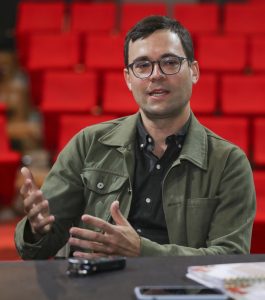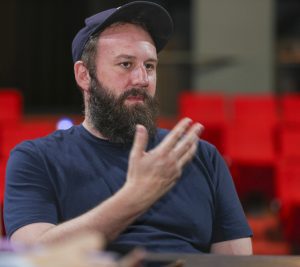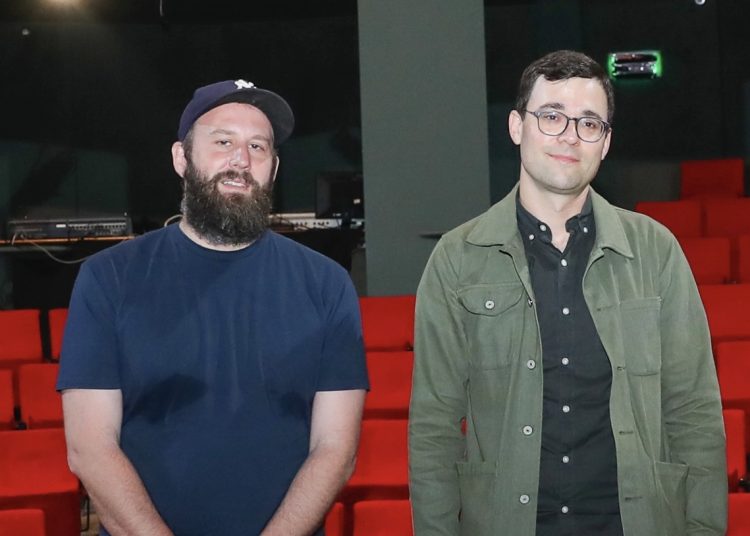Writing comedy has never been easy. A fine line usually exists between being funny and being silly.
This is why American scriptwriting partners, Matteo Borghese and Rob Turbovsky, like to generate comedy from unexpected situations, even without looking witless.
Borghese believes that one does not need a pun to be funny.
“Mostly, what is funniest is seeing people doing things you laugh at in real life,” he said.
“So, seeing for instance, a Mafia family trying to hold an intervention, this is always going to be funny because it is just an unusual scenario with unusual characters.”
Borghese and Turbovsky were in Egypt last week to train senior Egyptian scripters in comedy writing as part of a five-day workshop.
The event, sponsored by the US Embassy in Cairo and the American Film Showcase, focused on narrative and character development, with a particular focus on humour as a messaging medium.
Turbovsky said there is always something funny, regardless of how bleak a matter or a situation can be.
“This is great because I think it is more reflective of the truth of being alive,” he added.
Borghese and Turbovsky are the co-executive producers and writers of the Emmy-nominated Only Murders in the Building.
The pair has developed pilots at Comedy Central, TBS, ABC, and Fox. Their television credits include Silicon Valley, Lady Dynamite, Black Monday, It’s Always Sunny in Philadelphia, and Detroiters.
Borghese said stories are always the main preoccupation of comedy and drama writers.
He noted that it is not easy for writers to create interest in the issues they are trying to raise or the characters they are trying to create.
“It is a really difficult trick to write something down on paper and invent people out of your head,” he added.
He said this is 90% of the job, whereas the remaining 10% are the jokes that writers can put in.
“They are fun for us. It does not really drive our feelings about the show. It is the cherry on top of the cake,” he explained.
He and Turbovsky have been writing partners for the last decade, in both television and cinema.
Both received MFAs in screenwriting from the University of Southern California and have been nominated for the Emmy, Golden Globe, and Producers Guild of America awards.
Turbovsky said as scriptwriting partners, he and Borghese spend most of the time with each other.
“I think part of having an artistic partner can be a challenge,” Turbovsky said. “It is like any other kind of relationships where you have to navigate each other’s feelings.”
Borghese expressed concern, however, about the effects artificial intelligence could have on scriptwriting.
He and his partner believe AI cannot replace human writers, at least for now.
“AI is a big area of concern, but I think the technology I have seen, that exists now, is not there yet,” Borghese said. “We would like to think that we could bring something that the machine could not bring, but probably horses used to think that they cannot be replaced by cars.”
Turbovsky said AI cannot create something new.
“From what I understand about how AI works, at least right now, it is just recombining things that exist,” Turbovsky said. “It is not actually creating anything new. So hopefully the desire for new ideas will keep human writing alive.”
In their comedy scripts, Turbovsky and Borghese have their own repeated patterns that make them unique.
“As an unconscious pattern, I have noticed that there are certain types that we are drawn to, like people who are really confident, but should not be, losers, morons – failure is a big theme,” Turbovsky said laughingly.
For them, comedy is about human feelings, which means that people can laugh when watching the same situations, regardless of their background.
“There are always things that make everybody laugh because there are experiences that we all go through,” Borghese said. “Everybody has parents and becomes a teenager in some point.”
He referred to what he described as ‘universal’ things that travel.
“If you keep your comedy just on the most basic level, then I think people will find it funny, no matter where they are,” Borghese said.
Turbovsky gave an example of the Egyptian television series, Finding Ola, which was produced by Netflix in 2022 and written by Ghada Abdel Aal and Maha Elwazir.
He viewed it as a good script that can be enjoyed by anyone.
“You can see a show like that being made in America very easily because it is a universal situation,” Turbovsky said. “Everybody knows somebody who is going through a situation like that, so naturally it is funny.”








Discussion about this post